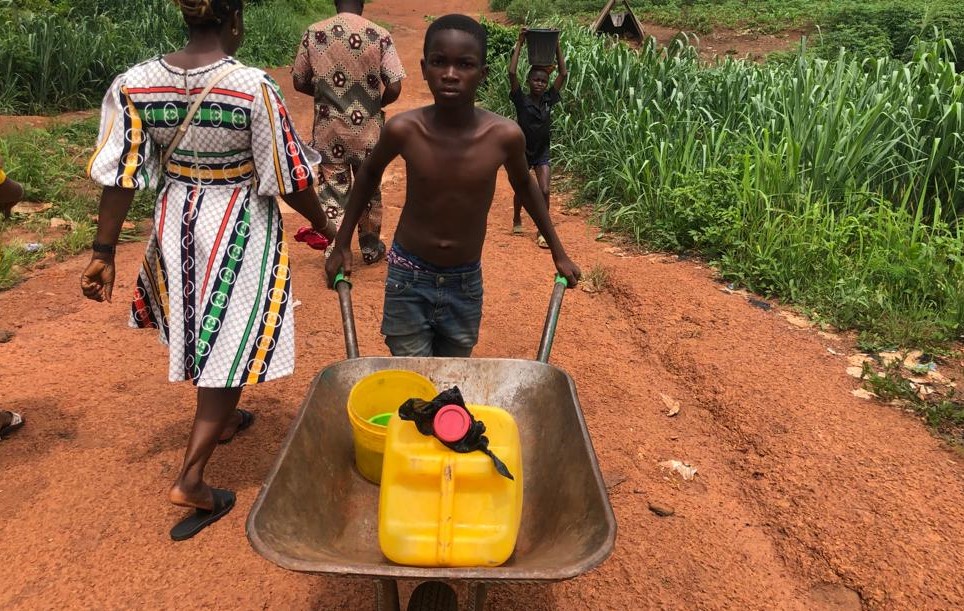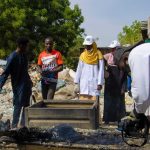Most rural communities in Nigeria are daily exposed to public health risks because they rely on contaminated streams for drinking water. ‘Pushed to Action’ is a three-part series exploring how locals in far-flung communities are improving easy access to safe drinking water.
Read the first serieshere and the second here
In October 2021, the Network of Water Rights Initiative or NWRI saw a video on social media of a refuse site near the Afanodu stream, a stream that served the water need of residents in Obeagu, a community in Nigeria’s southeastern Enugu State, it immediately sent a team to assess the situation.
The team found that the refuse site where residents dumped waste indiscriminately was posing a serious health risk, especially as each time it rained, flood-washed waste into the Afanodu stream, which has its source from nearby rocks.
This then led NWRI, a coalition of 23 civil society organisations working to improve access to safe water in Nigeria, to first hold an awareness campaign in the community, sensitising and enlightening the residents on the health implications of dumping wastes indiscriminately at the site.
“We did that [awareness creation] because it is our responsibility as a network, and whatever concerns communities in the state [have] regarding WASH, is our concern,” NWRI’s coordinator, Amaka Nweke, said. “Also, most communities are not aware that they play roles in contaminating their water… we have to inform them.”
After the one-week awareness campaign, the network contacted the state government, a member representing the area in the state House of Assembly, and officials of the state Ministry of Environment and asked for assistance in evacuating wastes at the refuse site.
In response, the ministry, through the state’s waste management authority, cleaned up the site and evacuated the waste in November 2021.
The practice of disposing of waste indiscriminately is not unique to Nigeria. Around the world, two million tons of sewage, industrial, and agricultural waste is released into the water.
But as measures to prevent residents of Obeagu from dumping wastes at the site, the community introduced a penalty of N20,000 ($25) to anyone found disposing of wastes at the site.
“Before they evacuated the wastes, the network [NWRI] asked us what would be our contribution to make sure there won’t be a recurrence and we told them we would utilise local security to ensure people don’t dump wastes there and also fine defaulters. We have been doing that since then,” Ijeoma Nnaji, a resident and former councilor of Obeagu community, said.
Advocacy-based approach
Formed in 2019, NWRI uses advocacy to improve access to water and sanitation in communities in Enugu. This is done through collaboration with WASH-focused community-based organisations, community stakeholders, and the government.
“We believe that when we partner, it is easier to solve problems around water and sanitation,” Nweke said. “The collaboration with the government matters a lot because it is sometimes difficult to get or pass information to the government when there is no synergy.”
Already, results are trickling in from the collaboration with the government. For example, in July 2021, the state government signed a water bill into law aimed at improving water supply and sanitation services in the state.
“We made sure the bill was signed into law. We interacted with state house of assembly members representing WASH areas, had a series of meetings with them, paid advocacy visits, and had dialogues that led to the passage of the bill,” Nweke said.
Also, the network frequently holds interactive forums where community members, government officials, and members of WASH-focused community-based organisations come together to discuss and share insights on WASH issues.
It also visits communities to educate them on their right to safe and clean water and how to protect their water sources from pollution and contamination. So far, the network has engaged locals in over 20 communities in thestate.
However, residents in the Obeagu community still struggle with hard-to-remove debris stuck in sand near the stream, which they fear would expose them to public health risks. “There are remains from the wastes, and we do not know what to do anymore to get rid of them,” said Ralph Ogbe, a resident and chairman of Amagu/Okponu village in Obeagu.
Mobilising communities for water projects
Just like NWRI, Source of Hope Foundation, a nonprofit helping locals in rural communities, is using advocacy and frequently engaging community members to improve water, sanitation, and hygiene services in Nigeria’s Northcentral Nasarawa state.
Asibi Ogabo, the foundation’s founder, said when locals in rural communities are mobilised and provided with the right information, they can work together to improve water, sanitation, and hygiene services in their communities.
“Most communities don’t understand that when they come together and work together, they can construct boreholes that will supply them water,” Ogabo said.
She adds that what her foundation does is to “go to communities, mobilise them [locals] to contribute [money] and dig boreholes that will be an alternative source of water.”
In 2009, for example, the foundation visited Agaza, a community in Nasarawa State. It first met with the community leaders, explaining its plan to commence a water project in the community.
After the initial meeting, the leaders mobilised other members of the community for a meeting with the foundation. At the meeting, the foundation enlightened the locals on proper hygiene and then convinced them to contribute money amounting to 10% of the total cost of drilling amanualborehole, while the foundation – with funding support from the state’scommunity and social development agency – was to cover the rest.
Next, a committee of about 15 people was set up to monitor the project. And when the project was completed in 2013, the community, after a series of meetings, agreed to pay a certain amount to help the committee maintain the borehole.
The amount to pay before collecting water from the borehole depends on the size of the bowl or jerry can.
Rose Iwar, a farmer in Agaza, said she pays N20 ($0.02) to collect water she uses to cook, wash, and bathe. “The plan [to pay] is good, and we enjoy the borehole very well because, before we go to the stream to [collect] water and we suffer doing that,” the mother of five said.
“The borehole is helping us,”adds Sabo Umar, the community’s chairman. “The stream is far, and people sometimes suffer from snakebite while going to the stream. Women leave the house around 4 am to fetch in the bush where the stream is, and they return around 9 am.”
But the borehole is serving over 1,000 people in the community, and because of this, people always form long queues to get water, especially in the morning. This has resulted in fights at different times on whose turn it is to collect water.
“The borehole always develops faults because of the population,” 50-year-old Umar said. “We have repaired the borehole 3 times. Because of the population, people fight when they come to [collect water] from the borehole.”
Meanwhile, Iwar is glad the borehole is serving her family. But she hopes more boreholes would be constructed in strategic locations in the community to address the problem that comes with one borehole.
“We appreciate the borehole we have, but we need more in the community to serve everyone,” Iwar said.
This story was produced with the support of Nigeria Health Watch through the Solutions Journalism Network, a nonprofit organisation dedicated to rigorous and compelling reporting about responses to social problems.
Most rural communities in Nigeria face significant public health risks due to reliance on contaminated streams for drinking water. ‘Pushed to Action’ is a series examining local initiatives to improve access to safe drinking water. In southeastern Enugu State, the Network of Water Rights Initiative (NWRI) responded to contamination of the Afanodu stream caused by nearby refuse dumping. NWRI conducted an awareness campaign to educate residents on the health impacts of improper waste disposal and collaborated with the state government and other officials for waste evacuation.
NWRI, a coalition of 23 civil organizations, uses advocacy to enhance water and sanitation access, partnering with community stakeholders and the government. Their efforts contributed to the passage of a state water bill in July 2021, aiming to improve water supply and sanitation services. NWRI also holds forums to engage community members and government officials in discussions about water, sanitation, and hygiene (WASH) issues, educating locals on safe water practices.
Despite these efforts, challenges remain, such as debris near water sources in Obeagu community. Similarly, the Source of Hope Foundation mobilizes rural communities in Nasarawa State to improve WASH services. For instance, they facilitated the construction of a borehole in Agaza, where community members contributed to the project and agreed on a payment plan for borehole maintenance. While this borehole serves over 1,000 people, the high demand has led to conflicts and frequent repairs, highlighting the need for additional infrastructure.
This narrative underscores the importance of community participation and advocacy in addressing water insecurity and public health risks in rural Nigeria, supported by strategic collaborations with government bodies and non-profit organizations.
This story was produced with the support of Nigeria Health Watch through the Solutions Journalism Network, a nonprofit organization dedicated to rigorous and compelling reporting about responses to social problems.






